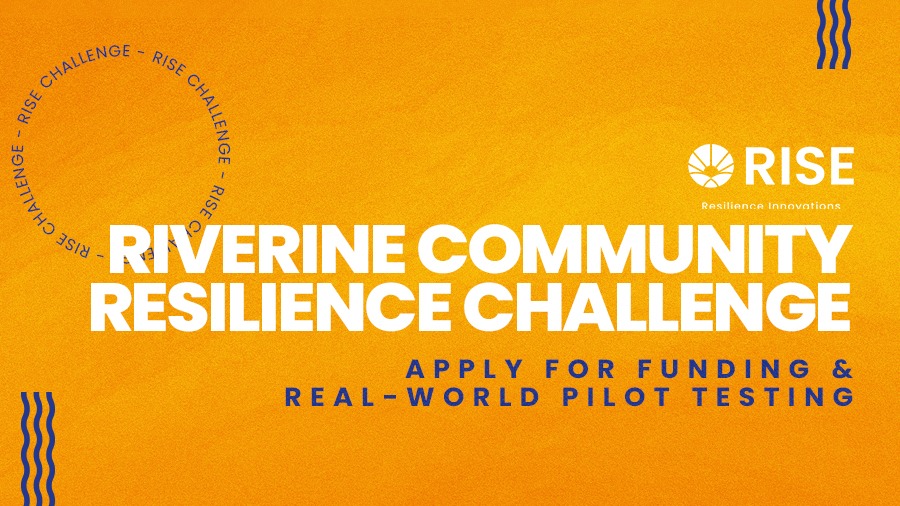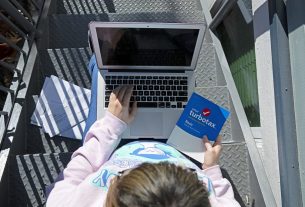The 2024 RISE Riverine Community Resilience Challenge accelerates innovation by connecting problems needing better solutions to innovators with new resilience-building technologies, products, and services.
RISE is a U.S.-based nonprofit with a mission to accelerate innovation and business growth by identifying, validating, and scaling solutions to community climate resilience challenges such as flooding and sea level rise. RISE achieves this by running Community Resilience Challenge competitions and offering funding and other support from its Resilience Innovation Fund (RIF), Accelerator, Hub, and Testbed in Virginia.
Context for the Riverine Community Resilience Challenge
As climate change brings more frequent and intense storms, riverine communities are increasingly vulnerable to unique flood threats that can change lives in an instant.
On August 30, 2021, Hurley, Virginia, experienced severe consequences when 7 inches of rainfall from the remnants of Hurricane led to a riverine flood that tragically took one life, destroyed 19 homes, and severely damaged 24 more. Less than a year later, on July 12, 2022, similar circumstances struck Whitewood and Pilgrims Knob in Virginia. Though no lives were lost in this latter event, the storm led to the destruction of 21 homes and damage to 25 others.
FEMA did not provide individual homeowner assistance in both instances, and only a few affected residents received insurance payouts.
The hazards of such events are multifaceted, including heavy rain, strong winds, high and swift waters, and mudslides. These natural forces can cause significant damage to buildings, potentially leading to destruction, injuries, or fatalities. Further, they often result in large quantities of debris, the collection and removal of which are costly and time-consuming, adding to the challenges faced by impacted communities.
Why Join the Riverine Community Resilience Challenge?
A total of up to USD 1 million in funding is available to support solutions in response to this Challenge. Applicants can apply for up to USD 300,000 in non-equity funding. Teams of businesses can submit integrated solutions and may receive up to USD 750,000.
Since 2018, RISE has deployed more than USD 7 million in non-equity funding and services from the Resilience Innovation Fund to 35 businesses developing scalable solutions that create substantial new value, can be demonstrated in Virginia, and be built into sustainable ventures. The RIF is seeded with funds from the U.S. Department of Housing and Urban Development and the Commonwealth of Virginia.
RISE also accelerates the growth of businesses developing innovative solutions to climate resilience challenges. The Resilience Innovation Accelerator works with winners of the RISE Community Resilience Challenges to help businesses maximize the impact and become sustainable after the RISE funding. The Accelerator offers a two-month program based on the National Science Foundation’s I-Corps techniques tailored to the resilience sector.
Further, RISE brokers companies’ access to Virginia’s resources through its Resilience Innovation Hub & Testbed for validating or otherwise demonstrating resilience-building innovations. RISE facilitates access to real-world pilot sites and permits, a co-working office and workshop space in Norfolk, Virginia, data and key stakeholders, a community of resilience entrepreneurs, PR opportunities, and regulatory technical assistance.
In addition to the above benefits, companies also benefit from:
- Regulatory and permitting assistance
- Access to real-world datasets
- Access to an established resilience community
- PR support and media visibility
- Strategic collaborations with experts and stakeholders
Flood Event Early Warning
The Challenge: Riverine flooding events are getting more severe and frequent. There is a need for accurate and timely warnings to protect communities.
Potential Solutions: Identification of flooding-affected regions from 12 hours before pluvial-induced flooding events, continuously updated through the passage of the rainfall activity. Generation of flood event warnings and the development of a warning-generation protocol. Inclusion of communication infrastructure to ensure that messages/data get transferred to required personnel. Protocols for actions to messages for all constituents (e.g., emergency managers, rescue squads, first responders, etc.).
Landscape and Building Adaptation
The Challenge: Post-flood, events frequently result in significant landscape changes, impacting the suitability of certain areas for rebuilding. Recognizing this, there’s a growing consensus that some land parcels are no longer fit for traditional construction. Identifying the most beneficial post-flood use for these areas presents a challenge. These areas could serve as testing grounds for innovative building methods designed to withstand flooding.
Potential Solutions: RISE is seeking solutions that:
- Consider building/landscape mitigations with either new or existing adaptation techniques. Additional mitigations may be considered if the applicant provides comprehensive details of the technology and its benefits. Both rural and more urban environments may be considered.
- Identify the most appropriate and cost-effective building/landscape adaptations on a parcel-by-parcel basis including a method or access to a method, for performing a benefit-cost analysis for every building and parcel.
- Provide mitigation that can be implemented on properties pre- and post-disaster.
- Offer a benefit-cost analysis (BCA) on a parcel-by-parcel basis using the most current topography and flood event datasets.
- May be implemented using local labor and contractors, to support the local business community and workforce.
- Provide analysis and estimate of the reduced cost of insurance enabled by the mitigations.
Check the website for more details in the Applicant Guide.
Community Insurance Program
The Challenge: Many homeowners and renters in rural areas lack flood insurance. As a result, financial aid (and other support) for these communities after flood events typically comes from state flood relief funds, which are often allocated through specific budget requests, or from charitable donations. However, these funds are primarily directed toward homeowners, often leaving renters without support.
In addition, the median income of the region is low (one of the reasons that many in the community do not participate in flood insurance programs). This topic intends to build a sustainable insurance program that helps these residents and others.
Potential Solutions: Solutions are being sought for the design of an insurance program that:
- Provides support to households and businesses after events by shifting risk through insurance and other financial strategies, ensuring protection against major losses.
- Address residents’ and businesses’ needs at (approximately) defined times:
- Needs may range from food, shelter, and short-term funds to building replacement costs. Part of the Challenge will be to document these needs.
- Pays out after clearly describable and measurable flooding event level if a parametric program is proposed. Approaches other than parametric programs will also be considered.
- Provides payout funds quickly and in a way that is accessible by all constituents – in conjunction with findings from the Residents’ Community Insurance topic area.
- Considers riverine flooding as the only peril.
- Is sustainable throughout the region of Southwest Virginia — as defined by the LENOWISCO PDC, Cumberland Plateau PDC, Mount Rogers PDC, and the New River Regional Commission.
- Is supported by a resident recovery program to provide guidance pre- and post-event assistance and guidance. Offers pre- and post-event assistance and guidance through a resident recovery program. The goal of this Challenge is to design an insurance program that can work with and aid in such support programs.
Who Can Apply?
This challenge is open to all global small businesses and nonprofit organizations working on flood adaptation, mitigation, and management solutions. Applicants may also partner with larger companies or research institutions, however, the project lead must be from small businesses/nonprofits. In addition:
- You have to be a business entity.
- Your business has to be able to deploy your solution in Southwest Virginia, either by yourself or by hiring a local partner.
- Your solution has to be at the prototype stage or later.
- If you are selected as a finalist, you will be required to submit additional documentation, including technical details of your solution and a work plan.
- Finalists will be required to register with the Virginia State Corporation Commission (SCC).
Timeline of the RISE Riverine Community Resilience Challenge
Applications are now open!
- April 4th, 11th, 18th, 25th — 1 pm EST: Weekly informational webinars.
- May 6th, 2024 — 2 pm EST.: Application Submission Deadline
- May 10th, 2024: Alert Finalists
- May 20th, 2024: Deadline to Submit Additional Documentation
- June: Winners Announced
RISE is looking to fund innovative approaches that can be built into viable and sustainable businesses. This means businesses that generate revenues through sales of their products and/or attract further investment to grow or develop revenue sources.
Find all the details about this unique challenge & send in your application today.
____
Sharing is Caring!



